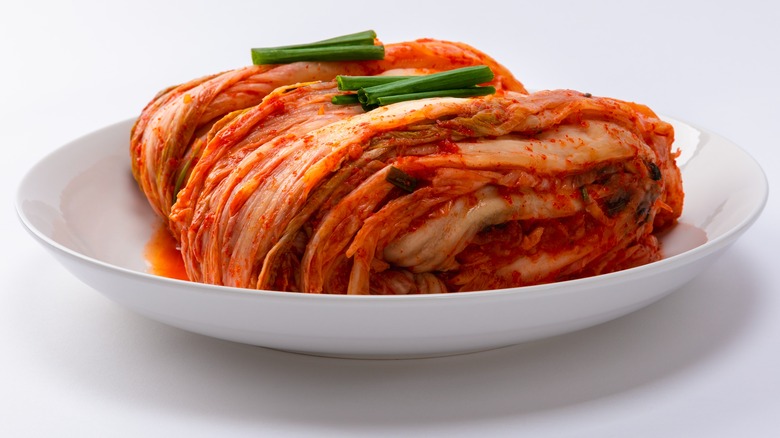Can You Freeze Kimchi, And Will It Affect The Quality?
Some foods are made to be frozen. Yet, kimchi is not — at least, it wasn't originally. Indeed, to some folks, it's meant to be hot — in both the spicy and temperature sense.
This Korean dish is basically fermented vegetables. However, there are myriad variations of kimchi, with some being hotter than others. Gochugaru (Korean chili flake), for instance, is often added to make kimchi piquant. Many kimchis also end up in warm dishes such as hotpots, rice bowls, and soups. That isn't required, however. Kimchi can also be used at room-temp as a condiment, side dish, or wrap.
Still, coolness is recommended for storing kimchi — which is why kimchi is traditionally prepared in the fall and winter — but we're talking fridge rather than freezer. Even cold dishes like kimchi bibim guksu and mul kimchi aren't quite icy. So, why would someone want to freeze kimchi at all?
Kimchi began as a preservative
Originally, kimchi was developed as a method for saving vegetables in anticipation of the cold winter months when veggies grow sparse. This process, called Kim-Jang, is so culturally significant that it's on the UNESCO World Heritage List. So, does that mean kimchi doesn't go bad?
Yes and no. Two weeks of fermentation is considered the point at which kimchi becomes ready to eat. However, it was initially intended to keep veggies in edible form anywhere from a couple months to a whole year. As time goes on, the kimchi becomes more pungent, savory, and tangy yet less crunchy. So, depending on your personal preference, that might constitute going bad, but to some, those deepened flavors are preferable; you can often find such kimchi in fried rice or jjigae stew. Regardless, though, kimchi doesn't technically spoil, thanks to its saltiness and acidity.
Even a sour smell and some fuzzy white mold is to be expected with kimchi. However, if kimchi starts to stink, grow excessively moldy, or drastically change color, then you'll know your kimchi has somehow gone bad despite its preservative nature. So, all that said, perhaps it's not too untraditional to try to make your kimchi last longer by freezing it, after all. Still, can you really do such a thing without ruining it?
Freeze kimchi to make it last longer
As it turns out, yes, you can indeed freeze kimchi. When you don't want to waste leftover food, and repurposing kimchi in the short-term isn't an option, the freezer does allow you to save kimchi for much later on. In fact, you can add about a year and a half to your kimchi's shelf life by doing so — although, only waiting a couple months is ideal. The only downside is that the taste will weaken and the texture will grow slimy, plus it'll naturally be less fresh and nutritious than beforehand.
Here's one way to do this: Submerge your kimchi in boiling water for a minute or two before freezing it, in order to safeguard the taste and eliminate any contaminants. Then, dry out your kimchi a bit so that extra juices don't freeze then melt and waterlog the stuff when you defrost it. Lastly, spread the food out in the freezer to avoid freezer burn. A few final tips: Use airtight plastic containers (not glass jars), label them with the date of freezing for future reference, and try not to refreeze kimchi a second time.
What if you're just curious about what frozen kimchi tastes like after it's warmed back up, though, and you don't want to wait several months? Well, you could just go buy some freeze dried kimchi online. Whatever sounds the coolest to you!


